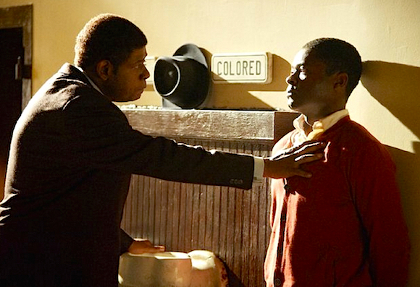
Movie Review: The Butler Misleads Oppressed Nations
The Butler
2013

The Butler portrays the life of Cecil Gaines, a butler in the White House for 34 years, starting in 1957. The movie is a fictionalized version of the story of Gene Allen’s life. MIM(Prisons) sums up this movie as propaganda to quell the just anger of the oppressed nation masses, encouraging them to work within the system for small changes.
The focus of the movie is on the oppression of New Afrikans from the 1950s to the year 2008, dividing its focus between the White House and the successive Presidents, and the activists in the streets. In the streets the movie gives special focus to the Freedom Riders and Martin Luther King Jr. The movie derides the most important political leaders of the time, barely mentioning Malcolm X, and attempting to portray the Black Panther Party (BPP) as a brutally violent movement out to kill whites, just using the community service programs like free breakfast for school children as a cover.
The heroes of the movie include Gaines’s son, Louis, who participates in the civil rights and activist movements over the years and eventually “learns” that the best way forward is to push for change from within, and runs for Congress. We see his dedication as a Freedom Rider, and fierce commitment to freedom and justice, as Louis literally puts his life on the line, enduring brutal beatings, repeated imprisonments, and constant threat of death. Louis moves on to work with Martin Luther King Jr. in a highly praised non-violent movement, and then joins the BPP after King is killed. Louis turns from an articulate and brave youth into a kid spouting revolutionary platitudes that he doesn’t seem to understand, making the BPP into a mockery of what it really represented.
The other heroes of the movie are the U.$. Presidents. With the exception of Nixon, who is portrayed as a drunk, all the other Presidents are humanized and made to appear appropriately sympathetic with the civil rights movement. While they all are shown saying things clearly offensive, racist, and in favor of national oppression, each President has a moment of redemption. John F. Kennedy tells Gaines that it is Gaines’s persynal history and the story of his son’s activism that changed his mind on the need for the civil rights movement. Even Ronald Reagan is shown secretly sending cash to people who write to him about their financial problems, and telling Gaines that he’s sometimes worried that he’s on the wrong side of the civil rights movement. On a positive note, all of the Presidents were shown as reticent to take any positive action towards change until the popular movement forced them to act. This is the reality of any oppressor class.
Gaines does, in the end, come to the realization that real change was not going to come from the White House, and quits his job to join his son in activism in the streets. But this action is played up to be as much an attempt to reconcile his relationship with his son, as a dedication to activism itself. And the activism seems to end with just one protest. In the end, both Cecil and Louis celebrate the “victory” of Obama in the 2008 election as a sign that their battle is finally over.
The Butler does a good job of portraying the Civil Rights movement of the 1950s and 60s, but only as a minor part of the plot. And it ultimately suggests that New Afrikans should be satisfied with an imperialist lackey in the White House as a representation of their success and equality with whites. It fits into a group of recent movies that Hollywood has produced, such as Lincoln and 12 Years a Slave, to rewrite Amerikan history to quell the contradiction between the oppressor nation and the New Afrikan internal semi-colony.








